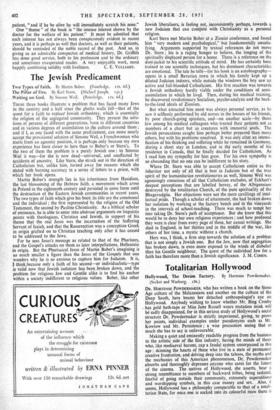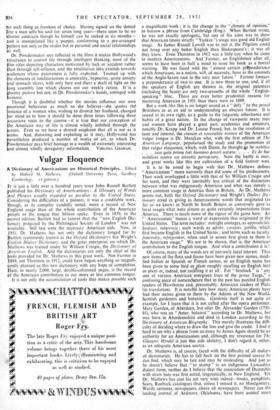Totalitarian Hollywood
Hollywood, The Dream Factory. By Hortense Powdermaker. (Seeker and Warburg. 18s.) DR. HORTENSE POWDERMAKER, who has written a book on the Stone Age culture of the Melanesians and another on the culture of the Deep South, here beams her detached anthropologist's eye on Hollywood. Anybody wishing to know whether Mr. Bing Crosby
has gold bath-taps or Miss Jane Russell wears mutation mink, will be sadly disappointed, for in this serious study of Hollywood's social structure Dr. Powdermaker is strictly impersonal, giving, to prove her points, individual examples under pseudonyms such as Mr. Kowtow and Mr. Persistence ; a wise precaution seeing that so much she has to say is unfavourable.
Making a quiet and eminently readable progress from the business to the artistic .side of the film industry, baring the minds of those who, like mediaeval barons, cap a feudal system unsurpassed in this age ; skinning the hearts of those who live in a state of permanent creative frustration, and delving deep into the taboos, the myths and the mechanics of this American phenomenon, Dr. Powdermaker absorbs and thoroughly depresses _anyone who cares for the future of the cinema. The natives of Hollywood, she asserts, bear a strong resemblance to members of backward tribes, being isolated, fearful of going outside their community, extremely superstitious and worshipping symbols, in this case money and sex. Also, it seems, Hollywood has a philosophy comparable to that of a totali- tarian State, for once one is sucked into its colourful maw there is tio such thing as freedom of choice. Having signed on the dotted pine a man sells his soul for seven long years—there seem to be no Whorter contracts though he himself can be sacked in six months— 'and is manipulated like a puppet, conforming to a pre-arranged tattern not only in the studio but in personal and social relationships s well. Dr. Powdermaker sees reflected in the films it makes Hollywood's reluctance to control life through intelligent thinking, most of the rim roles depicting characters motivated by luck or accident rather han through self-reliance, and the totalitarian idea extends towards ludiences whose passiveness is fully exploited. Teamed up with he elements of totalitarianism is amorality, hypocrisy, acute anxiety nd stomach ulcers, with only here and there a shaft of light on the ong assembly line which churns out our weekly ration. It Is a loomy picture but not, in Dr. Powdermaker's hands, untinged with umour. Though it is doubtful whether the movies influence our own motional behaviour as much as she believes—she quotes th0 instance of a woman who, wishing to divorce her husband, changed pier mind as to how it should be done three times following three uccessive visits to the cinema—it is true that our conception of he American way of life is almost wholly imbibed through the preen. Even so we have a shrewd susOcion that all is not as it ems. And, distorting and exploiting as it may, Hollywood has evertheless produced a number of works of art, to which Dr. owdermaker pays brief homage in a wealth of extremely interesting nd almost wholly derogatory information. VIRGINIA GRAHAM.



































 Previous page
Previous page